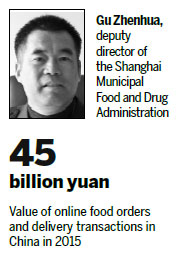Shanghai puts teeth into e-food oversight
Updated: 2016-04-20 07:49
By Zhou Wenting In Shanghain(China Daily)
|
|||||||||
Shanghai will require companies that offer food ordering and delivery through online platforms to sign a contract committing them to unified standards of service. 
The commitment, drawn up by the Shanghai food market watchdog, would require vendors to display their latest food operating license and to prepare food safely. The watchdog will keep a copy of the signed agreements to hold people accountable, according to the draft of the Shanghai Food Safety Law and Regulations that was recently submitted to the municipal legislative body for discussion.
"It will be the first time the rapidly developing online food ordering market has been brought under control through legislation in Shanghai," said Gu Zhenhua, deputy director of the Shanghai Municipal Food and Drug Administration. "All the vendors must register with their real names with the platforms and the platforms need to verify the qualifications of the vendors."
"If a platform finds a vendor has violated the terms, it must suspend cooperation with the vendor and report the incident to the watchdog. Otherwise, the platform will also be held accountable," he said.
Food ordering and delivery apps have been booming in recent years. Statistics from Analysys International, a Beijing-based internet consultancy company, show that the country's online food ordering and delivery transactions were worth more than 45 billion yuan ($6.96 billion) in 2015, three times higher than the previous year. The largest players - Ele.me, Meituan Takeout, and Baidu Takeout - are backed respectively by the country's internet leaders Alibaba, Tencent Holdings and Baidu Inc.
Meanwhile, complaints are rising. Statistics from the Shanghai Consumer Rights Protection Council show that, in the first half of last year, 200 complaints were received about the sector, which was a year-on-year increase of 138 percent. The complaints mainly centered on problems in food quality, delayed delivery and false advertising.
Liu Jiaxiu, a deputy to the municipal legislative body, said the sector is sorely in need of more control.
Related Stories
Crawfish, prawns provide sizzle for food fest 2016-04-13 13:24
Hong Kong gem captures flavors of Thai street food 2016-03-11 08:06
Fast food giant KFC opens outlet in Tibet 2016-03-10 08:07
Popular blogger helps viewers get food on the table 2016-03-08 08:08
Food makers see the snack in everything 2016-03-05 13:57
Today's Top News
Buckingham Palace seeks royal social media operators
Nearly 180,000 migrants reach EU by sea in 2016
Chinese group likely to seal AC Milan takeover deal
Global trade in fake goods worth nearly $500b: Study
Policymakers walk a fine line with property market
China says financial crisis caused weakening global steel demand
Embryos growing in space a 'giant leap'
Russia to defend regional security jointly with China
Hot Topics
Lunar probe , China growth forecasts, Emission rules get tougher, China seen through 'colored lens', International board,
Editor's Picks

|

|

|

|

|

|







